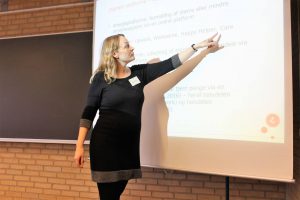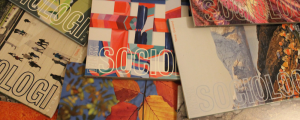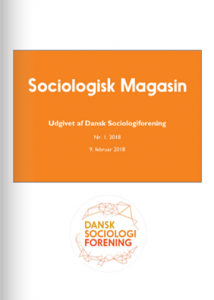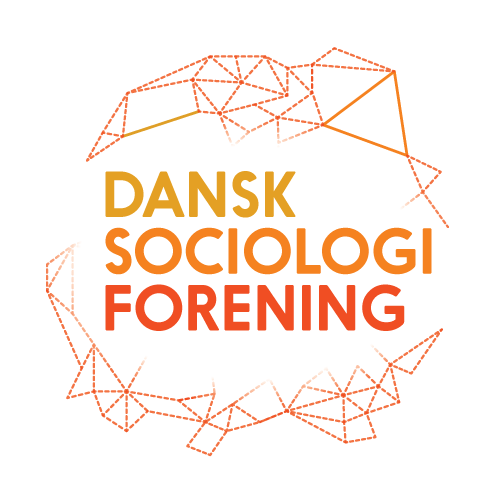Who are we?
The Danish Sociological Association is a voluntary association for anyone with an interest in sociology. The association was formed in 1965 with the purpose of creating a broad organization for sociologists and everyone with an interest in sociology, where sociology could be debated and developed in different ways. This goal is still a focal point of the association. Previously, the association required that all members had completed or were going to complete an education in sociology – this requirement was removed with a statutory amendment in 2015.
A professional association with a broad appeal
 Today, sociology has spread to many different areas of work, which increases the need for a community where the awareness of sociological professionalism can be debated and strengthened. In the Danish Sociological Association, we support networks and knowledge sharing across both public and private sectors, employed sociologists and students, and various subject areas.
Today, sociology has spread to many different areas of work, which increases the need for a community where the awareness of sociological professionalism can be debated and strengthened. In the Danish Sociological Association, we support networks and knowledge sharing across both public and private sectors, employed sociologists and students, and various subject areas.
Through our numerous activities, we create the opportunity to gather different parts of Danish sociology, so as many actors and voices as possible can be involved in the development of sociology in Denmark.
The association currently has around 600 members, which includes both students, employees and retirees. It is a focus of the association to represent sociology widely and not only represent specific topics or age groups. We therefore seek to have at least one member of the board of The Danish Sociological Association elected among those working outside academia. The students will influence the future of sociology and, therefore, the association also wants to strengthen transgenerational communities. The association always has several student representatives on the board and arranges various activities that are specifically targeted at the student community.
Geographically, the sociological landscape is spread widely across Denmark. Sociological educations can be found at universities in Copenhagen, Aalborg, Esbjerg, Aarhus, and Roskilde. It is of great value to the association to support these educations as well as further training of sociologists after they have completed their university education.
Most of the events organized by the association take place in Copenhagen, but it is a clear focus for the association not to limit itself to the metropolitan area. Therefore, the association has board members and activities in both Aalborg and Esbjerg, and we support the establishment of local associations within the framework of the association’s activities.
Sociology across borders
Sociology also plays a central role in the rest of the world. Therefore, the Danish Sociological Association is a member of – and works closely with – several international associations such as the Nordic Sociological Association (NSA), the European Sociological Association (ESA) and the International Sociological Association (ISA). It is important for the association not only to strengthen the professional community in Denmark but also across national borders. It is furthermore essential for the association to promote cooperation in sociological research both in Denmark and internationally.
Core activities of the association
Free events for everyone
Each year, the association offers around seven to ten events, which are free and open to all with an interest in sociology. The events range from lectures to debate panels and topics are often inspired by the latest research results, thematic issues in sociological journals, or current challenges and opportunities in the Danish society. Several of the events are organized in collaboration with local networks and organizations such as departments of Sociology at the universities, debate networks, publishers or student organizations.
In 2019, the Danish Sociological Association organized seven free events. During the year, the association collaborated with several co-organizers, including FAOS (Employment Relations Research Centre), Hans Reitzels forlag, Departement of Sociology (Copenhagen University) and the Coordination for Gender Studies.
Methodology courses for members
Members of the association have the opportunity to participate in two to three methods courses each year, where both students and professionals can develop skills in new sociological methods. Previous courses have covered qualitative longitudinal studies, the use of data from video surveillance in the streets (CCTV) as a sociological tool, and a brush-up course in causal inference.
Sociological Summer Camp
In 2019, the Danish Sociology Association launched the new format “Sociological Summer Camp”. The summer camp takes place in a weekend during summer, and it is an opportunity for sociology enthusiasts, where various sociologically relevant topics can be discussed over a campfire or while barbecuing. At the summer camp, there is room for both professionalism and socializing. The camp is an opportunity to meet sociology enthusiasts across sociological environments and industries.
Sociological Congresses
 Every second year, the Danish Sociological Association invites all Danes with an interest in sociology to a two-day scientific congress. During these days, knowledge, new research results, and ideas for further studies are exchanged. Different sociological environments meet and together we become more aware of what is happening in contemporary sociology.
Every second year, the Danish Sociological Association invites all Danes with an interest in sociology to a two-day scientific congress. During these days, knowledge, new research results, and ideas for further studies are exchanged. Different sociological environments meet and together we become more aware of what is happening in contemporary sociology.
In March 2022, the association organizes the Danish Sociology Congress in collaboration with DPU (The Danish School of Education) at Arhus University’s campus in Copenhagen. It will be the first time DPU is hosting the conference. The theme of the congress is “Optimization Logics and Change Processes: Consequences for communities and individuals”.
Communication strategy
The association communicates its activities through the web page as well as via our profiles on Facebook, Instagram and LinkedIn. Furthermore, we send a newsletter with information each month to all our members and others with interest. A communication group within the board of the association has been in charge of developing a communication strategy for the association, and a few years back we had a new logo and visual design as a part of a relaunch of the homepage.
Journals
 Each year, the Danish Sociological Association publishes four numbers of the scientific journal Danish Sociology. The journal’s editorial board is formally and practically independent of the association. However, like the association, it has the aim to convey new sociological research. The journal contains both scientific articles, essays, and book reviews and is often published as thematic issues such as “Social and Emotional Communities” or “Climate Sociology”. All members of the association receive the four issues of Danish Sociology for free. In addition, members also receive four annual releases of the journal ACTA Sociologica for free, published by the Nordic Sociological Association.
Each year, the Danish Sociological Association publishes four numbers of the scientific journal Danish Sociology. The journal’s editorial board is formally and practically independent of the association. However, like the association, it has the aim to convey new sociological research. The journal contains both scientific articles, essays, and book reviews and is often published as thematic issues such as “Social and Emotional Communities” or “Climate Sociology”. All members of the association receive the four issues of Danish Sociology for free. In addition, members also receive four annual releases of the journal ACTA Sociologica for free, published by the Nordic Sociological Association.
Sociological Magazine
 In early 2018, the association published the first issue of its free online magazine Sociological Magazine. The association needed a new format to distribute knowledge about sociology in Denmark in other ways than through scientific articles.
In early 2018, the association published the first issue of its free online magazine Sociological Magazine. The association needed a new format to distribute knowledge about sociology in Denmark in other ways than through scientific articles.
The Sociological Magazine focuses on the new and exciting topics of sociology in Denmark – both inside and outside the university walls. The pivotal point of the magazine is to portray contemporary Danish sociology as both a profession and a field of discussion in the private and public sector.
The magazine is published at least once a year and will contain minor analyses, interviews, and reports from the sociological world. The first release of the Sociological Magazine contained career portraits of four working sociologists.
Communication strategy
The association communicates its activities through the web page as well as our Facebook page and Instagram profile. Furthermore, we send a newsletter with information each month to all our members and others with interest. A communication group within the board of the association has been in charge of developing our logo and visual design.
Contact: lm@samf.ku.dk
